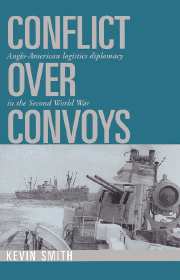Book contents
- Frontmatter
- Contents
- List of maps
- List of tables
- Preface
- List of abbreviations and codewords
- Introduction
- 1 “Not what it could or should be”: Britain's shipping situation
- 2 “Beyond our power without your help”: Britain's Battle of the Atlantic
- 3 “But westward, look, the land is bright”: American shipping assistance from neutrality to belligerency, March 1941–November 1942
- 4 Roosevelt's promise: “your requirements will be met”
- 5 The Casablanca Conference and its aftermath: a “most curious misunderstanding”
- 6 Reaping the whirlwind: the perils of impending victory
- Postscript and conclusions
- Appendices
- 1 Measuring merchant ship tonnage
- 2 The plight of British shipbuilding
- 3 Roosevelt's letter to Churchill, 30 November 1942
- 4 Behrens' interpretation of Roosevelt's letter
- 5 Text of SABWA 156, the CSAB (W) cable of 19 January 1943 which relayed the WSA's interpretation of Roosevelt's promise
- 6 Roosevelt's letter to Churchill, 28 May 1943
- Tables
- Notes
- Bibliography
- Index
3 - Roosevelt's letter to Churchill, 30 November 1942
Published online by Cambridge University Press: 06 July 2010
- Frontmatter
- Contents
- List of maps
- List of tables
- Preface
- List of abbreviations and codewords
- Introduction
- 1 “Not what it could or should be”: Britain's shipping situation
- 2 “Beyond our power without your help”: Britain's Battle of the Atlantic
- 3 “But westward, look, the land is bright”: American shipping assistance from neutrality to belligerency, March 1941–November 1942
- 4 Roosevelt's promise: “your requirements will be met”
- 5 The Casablanca Conference and its aftermath: a “most curious misunderstanding”
- 6 Reaping the whirlwind: the perils of impending victory
- Postscript and conclusions
- Appendices
- 1 Measuring merchant ship tonnage
- 2 The plight of British shipbuilding
- 3 Roosevelt's letter to Churchill, 30 November 1942
- 4 Behrens' interpretation of Roosevelt's letter
- 5 Text of SABWA 156, the CSAB (W) cable of 19 January 1943 which relayed the WSA's interpretation of Roosevelt's promise
- 6 Roosevelt's letter to Churchill, 28 May 1943
- Tables
- Notes
- Bibliography
- Index
Summary
Roosevelt's 30 November 1942 letter marked an abortive turning point in Anglo-American logistics diplomacy. Here is the complete text of the relevant section of the letter.
My dear Winston:
I presume that we shall never satisfy ourselves as to the relative need of merchant ships versus escort vessels. In this case I believe we should try to have our cake and eat it too.
At any rate we are moving aggressively here to increase both of these programs and have given them the highest priority for material and machine tools.
So far as merchant shipping is concerned, we have, after reexamination of our steel plate problem and other facilities, determined to increase it to 18,800,000 deadweight tons in 1943. I intend to raise this to 20 million tons if after reexamination by our people it should prove possible.
Of one thing I think you can be sure, that we will build in this country a minimum of 18,800,000 tons of merchant shipping of all kinds. Your offices here will keep you informed of the types of ships that are being built and, naturally, I would welcome your judgement in regard to this, because it is very important that we have a proper balance between tankers, cargo vessels and transports.
I agree that this is the time for me to reply to you concerning the very urgent requirements of the British shipping program in 1943.
- Type
- Chapter
- Information
- Conflict over ConvoysAnglo-American Logistics Diplomacy in the Second World War, pp. 242 - 243Publisher: Cambridge University PressPrint publication year: 1996



